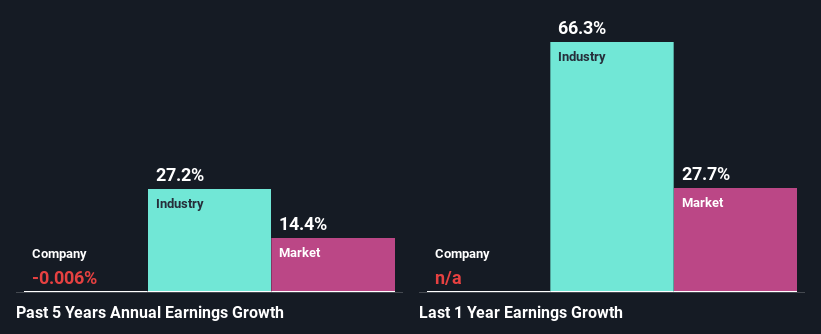Declining Stock and Decent Financials: Is The Market Wrong About Genesco Inc. (NYSE:GCO)?
With its stock down 16% over the past month, it is easy to disregard Genesco (NYSE:GCO). However, the company's fundamentals look pretty decent, and long-term financials are usually aligned with future market price movements. Specifically, we decided to study Genesco's ROE in this article.
Return on Equity or ROE is a test of how effectively a company is growing its value and managing investors’ money. In short, ROE shows the profit each dollar generates with respect to its shareholder investments.
View our latest analysis for Genesco
How To Calculate Return On Equity?
ROE can be calculated by using the formula:
Return on Equity = Net Profit (from continuing operations) ÷ Shareholders' Equity
So, based on the above formula, the ROE for Genesco is:
19% = US$115m ÷ US$602m (Based on the trailing twelve months to January 2022).
The 'return' is the profit over the last twelve months. So, this means that for every $1 of its shareholder's investments, the company generates a profit of $0.19.
Why Is ROE Important For Earnings Growth?
Thus far, we have learned that ROE measures how efficiently a company is generating its profits. We now need to evaluate how much profit the company reinvests or "retains" for future growth which then gives us an idea about the growth potential of the company. Assuming everything else remains unchanged, the higher the ROE and profit retention, the higher the growth rate of a company compared to companies that don't necessarily bear these characteristics.
Genesco's Earnings Growth And 19% ROE
To begin with, Genesco seems to have a respectable ROE. Yet, the fact that the company's ROE is lower than the industry average of 32% does temper our expectations. Further, Genesco's five year net income growth of -0.006% is more or less flat. Bear in mind, the company does have a respectable level of ROE. It is just that the industry ROE is higher. Therefore, the flat earnings growth could be the result of other factors. For example, it could be that the company has a high payout ratio or the business has alloacted capital, for instance.
Next, on comparing with the industry net income growth, we found that the industry grew its earnings by27% in the same period.
Earnings growth is a huge factor in stock valuation. What investors need to determine next is if the expected earnings growth, or the lack of it, is already built into the share price. By doing so, they will have an idea if the stock is headed into clear blue waters or if swampy waters await. What is GCO worth today? The intrinsic value infographic in our free research report helps visualize whether GCO is currently mispriced by the market.
Is Genesco Making Efficient Use Of Its Profits?
Genesco doesn't pay any dividend, which means that it is retaining all of its earnings. This makes us question why the company is retaining so much of its profits and still generating almost no growth? So there could be some other explanations in that regard. For instance, the company's business may be deteriorating.
Conclusion
On the whole, we do feel that Genesco has some positive attributes. Yet, the low earnings growth is a bit concerning, especially given that the company has a respectable rate of return and is reinvesting a huge portion of its profits. By the looks of it, there could be some other factors, not necessarily in control of the business, that's preventing growth. In addition, on studying the latest analyst forecasts, we found that the company's earnings are expected to continue to shrink. Are these analysts expectations based on the broad expectations for the industry, or on the company's fundamentals? Click here to be taken to our analyst's forecasts page for the company.
Have feedback on this article? Concerned about the content? Get in touch with us directly. Alternatively, email editorial-team (at) simplywallst.com.
This article by Simply Wall St is general in nature. We provide commentary based on historical data and analyst forecasts only using an unbiased methodology and our articles are not intended to be financial advice. It does not constitute a recommendation to buy or sell any stock, and does not take account of your objectives, or your financial situation. We aim to bring you long-term focused analysis driven by fundamental data. Note that our analysis may not factor in the latest price-sensitive company announcements or qualitative material. Simply Wall St has no position in any stocks mentioned.

 Yahoo Movies
Yahoo Movies 
